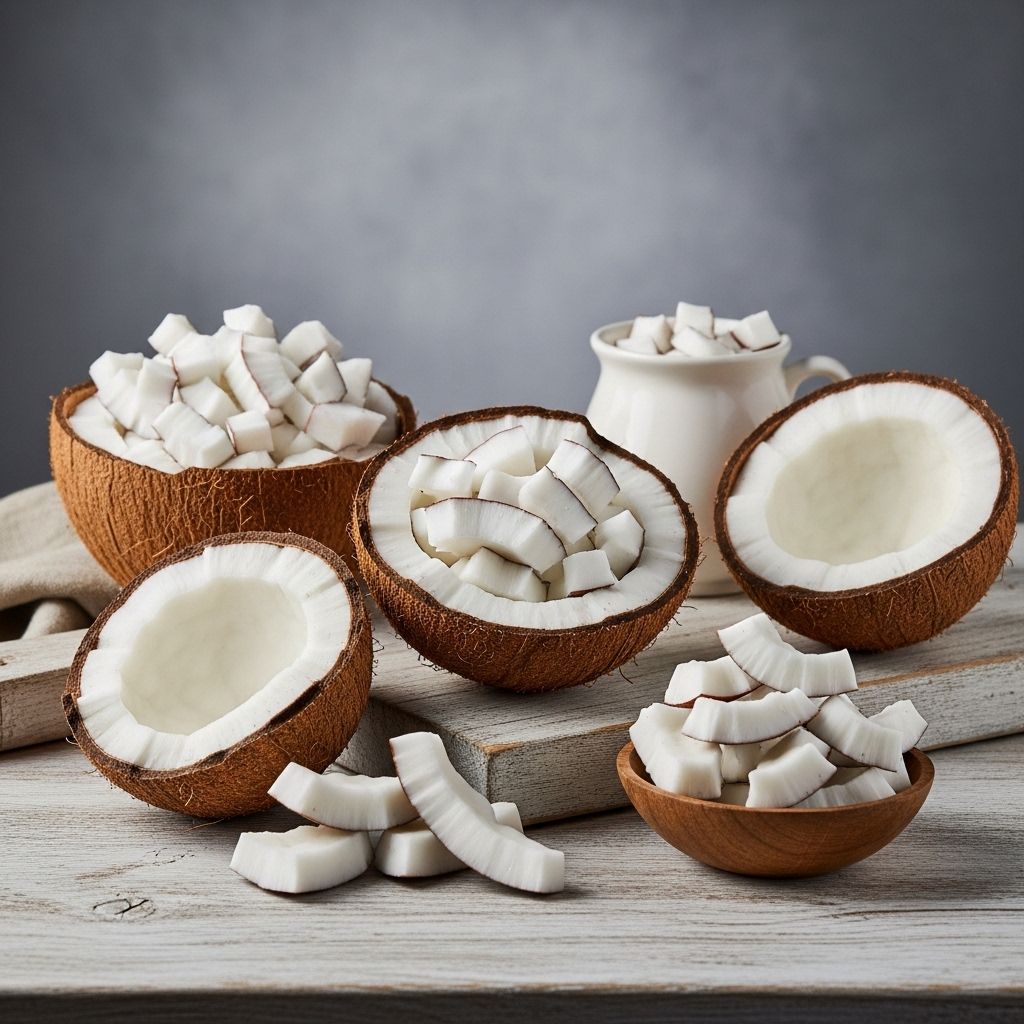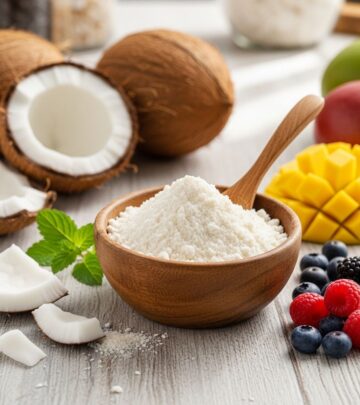Coconut Meat: Nutrition, Health Benefits, Risks, and Uses
A tropical favorite fills your diet with MCT-rich fats, fiber, and essential minerals for balanced wellness.

Coconut meat—sometimes called coconut flesh—is the edible white part tucked inside the shell of the coconut fruit. Popular across tropical regions and increasingly incorporated into global cuisines, coconut meat brings a rich texture, distinct flavor, and a dense array of nutrients to the table. This comprehensive guide explores the nutrition profile, health benefits, drawbacks, and culinary versatility of coconut meat, based on the latest scientific research.
What is Coconut Meat?
Coconut meat is the white, firm substance found inside a fresh mature coconut. This part of the coconut is distinct from coconut water (the clear liquid inside), coconut milk (a processed blend of coconut meat and water), and coconut oil (oil extracted from the meat). Coconut meat comes in several forms:
- Fresh coconut meat: The raw, moist flesh from a just-opened coconut.
- Dried coconut meat: Also known as desiccated or shredded coconut, used in baking and snacks.
- Coconut flakes or chips: Thinly sliced, often toasted, for both culinary and snacking purposes.
This versatile food is enjoyed raw or cooked, sweet or savory, and is used worldwide in an array of dishes ranging from curries to desserts.
Nutritional Profile of Coconut Meat
Coconut meat is prized not only for its flavor and texture, but also for its nutrient density. Below is an overview of the macro- and micronutrient values based on 1 cup (80 grams) of fresh, shredded coconut meat:
| Nutrient | Amount per cup (80 g) | % Daily Value (DV) |
|---|---|---|
| Calories | 283 | – |
| Protein | 3 g | – |
| Carbohydrates | 10 g | – |
| Fat | 27 g | – |
| Saturated Fat | 24 g | – |
| Sugar | 5 g | – |
| Fiber | 7 g | ~25% |
| Manganese | 1.2 mg | 52-60% |
| Copper | 0.35 mg | 39-44% |
| Selenium | 6.7 mcg | 15% |
| Iron | 1.8 mg | 11% |
| Phosphorus | 105 mg | 13% |
| Potassium | 240 mg | 6% |
| Zinc | 1 mg | 10% |
- Rich in healthy fats: Roughly 89% of the fat in coconut meat is saturated, although much of this comes in the form of medium-chain triglycerides (MCTs), which the body metabolizes differently compared to longer chain fats.
- High in fiber: Provides a significant portion of daily recommended fiber, mostly insoluble, aiding digestive health.
- Abundant minerals: Especially high in manganese and copper, and supplies notable amounts of iron, zinc, and selenium.
Comparison of Raw vs. Dried Coconut Meat
| Nutrient | Raw (100g) | Dried, Unsweetened (100g) |
|---|---|---|
| Calories | 354 | 660 |
| Protein | 3 g | 7 g |
| Carbohydrates | 15 g | 24 g |
| Fiber | 9 g | 16 g |
| Fat | 33 g | 65 g |
| Manganese | 65% | 119% |
| Copper | 48% | 88% |
| Iron | 14% | 18% |
Health Benefits of Coconut Meat
Scientific studies suggest several
health benefits
linked to moderate consumption of coconut meat.1. Supports Heart Health
Though coconut is high in saturated fat, much of it is in the form of MCTs. Some research indicates that these may boost HDL (good) cholesterol and potentially lower LDL (bad) cholesterol, especially compared to butter or animal fats. This improved cholesterol ratio is associated with reduced risk of heart disease.
- Studies found that people consuming coconut oil and milk had increased HDL and sometimes reduced LDL cholesterol.
- It is important to balance intake; excessive saturated fat (even from plants) may still pose cardiovascular risks for some individuals.
2. Aids Weight Management
The MCTs in coconut meat are metabolized rapidly for energy, which may increase calorie burning and promote feelings of fullness. The high fiber content also helps curb appetite and reduce overeating.
- One study found that daily coconut meat in the diet contributed to modest weight loss compared to peanut-based controls.
- Fiber plays a key role in satiety and healthy digestion.
3. Boosts Energy Levels
MCTs are absorbed quickly and used as a direct energy source, ideal for post-workout recovery or as a quick energy boost during the day.
4. Enhances Digestive Health
- Coconut meat contains primarily insoluble fiber, which helps keep the digestive tract moving and supports healthy, regular bowel movements.
- The fiber content supports beneficial gut bacteria, further promoting gut health.
5. Antioxidant and Immune Support
- Rich in manganese, copper, and selenium—all minerals with antioxidant roles that help reduce oxidative stress and may contribute to a strengthened immune system.
- Coconut’s phenolic compounds and polyphenols add extra antioxidant protection for the body.
6. Blood Sugar Control
- Coconut meat contains relatively few carbohydrates for a fruit, is high in fiber, and supplies healthy fats, all of which may help support blood sugar regulation and prevent sugar spikes.
- Some studies suggest coconuts may help improve insulin sensitivity, but research is ongoing.
Potential Risks and Drawbacks
While coconut meat has many health benefits, excessive consumption or certain health conditions may necessitate caution:
- High Saturated Fat: Coconut meat is one of the richest natural sources of saturated fat. Some health organizations recommend limiting saturated fat intake to lower the risk of heart disease, particularly for sensitive individuals.
- Caloric density: With about 350 calories per 100 grams, coconut meat can quickly add up calories, especially when eaten in large portions or as dried coconut.
- Allergic reactions: Coconut allergy is rare but possible. Symptoms may include hives, swelling, digestive distress, or (rarely) anaphylaxis.
- Digestive issues: Some people might experience bloating or diarrhea from high fiber intake or sensitivity to coconut fats.
- Interactions with certain conditions: Consult your doctor if you have elevated cholesterol, digestive disorders, or kidney issues before making coconut meat a major diet component.
How to Eat and Use Coconut Meat
Coconut meat’s versatility is one of its main attractions. Here are popular ways to enjoy it:
- Fresh and raw: Scoop straight from a freshly cracked coconut and enjoy as a snack or dessert.
- Dried/desiccated: Used in baking, energy bars, granolas, or as a topping for oatmeal, salads, and smoothie bowls.
- Coconut chips: Toasted for a crunchy, low-carb snack or salad ingredient.
- Blended into coconut milk or cream: Essential for many Southeast Asian, Caribbean, and Indian curries, soups, and stews.
- Desserts: Used to make puddings, cakes, pies, and traditional sweets worldwide.
- Fermented products: Such as coconut yogurt or kefir.
Tips for Buying and Storing
- Opt for unsweetened coconut meat to avoid excess sugar intake.
- Store fresh coconut in the refrigerator for up to several days; dried varieties have a longer shelf life and can be kept in a cool, dry place.
- For freshest taste, buy whole coconuts and crack them open at home, or select pre-prepared coconut meat from reputable sources.
Comparison Table: Fresh vs. Dried Coconut Meat
| Property | Fresh Coconut Meat | Dried/Desiccated Coconut |
|---|---|---|
| Water content | High | Low |
| Caloric density | Moderate | High |
| Flavor | Mild, creamy | Richer, more intense |
| Shelf life | Short (few days | Long (months) |
| Potential uses | Fresh eating, juicing | Baking, toppings, snacking |
Frequently Asked Questions (FAQs)
Is coconut meat good for you?
Yes, coconut meat is nutritious, providing healthy MCT fats, fiber, and key minerals like manganese, copper, and selenium. However, it is high in calories and saturated fat, so moderation is key—especially if you have cardiovascular risk factors.
Is coconut meat suitable for people with diabetes?
Coconut meat is relatively low in carbohydrates and high in fiber and fat, which can support blood sugar control. However, portion size matters, and it should be consumed as part of a balanced diabetic diet. Always check with your healthcare provider.
Can eating coconut meat help with weight loss?
The MCTs and fiber in coconut meat may help curb appetite and aid fat burning, but coconut is energy-dense. Including it in moderate portions, alongside other healthy foods, may assist in healthy weight management.
Can you eat coconut meat every day?
Most people can safely enjoy coconut meat daily in moderate quantities, but excessive intake may provide too much saturated fat and calories. Balance it with plenty of vegetables, fruits, and whole grains for a healthful diet.
Does coconut meat cause allergies?
Coconut allergy is rare, but not impossible. Individuals with tree nut allergies should check with their doctor before consuming coconut products, even though coconuts are technically a fruit (drupe), not a nut.
Conclusion: Is Coconut Meat Worth Including in Your Diet?
Coconut meat brings a unique combination of hearty flavor, pleasing texture, and a nutrient-dense profile to the plate. Rich in healthy fats, fiber, and important minerals, it offers several possible health benefits for heart health, digestion, energy, and more. Yet, owing to its high saturated fat and caloric density, it’s best enjoyed in moderation—especially for those managing cholesterol or calorie intake. With its versatility in the kitchen and potential to brighten up both sweet and savory dishes, coconut meat deserves a thoughtful spot in a varied, balanced diet.
References
- https://www.healthline.com/nutrition/coconut-meat
- https://www.medicalnewstoday.com/articles/coconut-meat
- https://www.healthline.com/nutrition/coconut-nutrition
- https://health.clevelandclinic.org/coconut-benefits
- https://www.webmd.com/diet/health-benefits-coconut
- https://www.urmc.rochester.edu/encyclopedia/content?contenttypeid=76&contentid=12108-1
Read full bio of Sneha Tete













